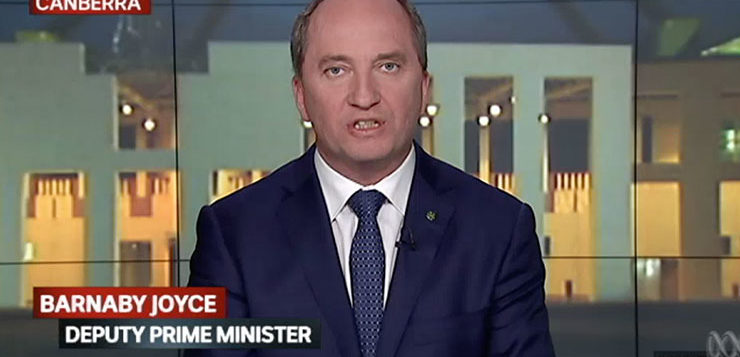For a long time, the Australian gut reaction to revelations like those in the Joyce affair is ‘that’s private’. Melissa O’Donnell very much thinks otherwise.
Some three weeks into this Barnaby Joyce saga, the issue has been dissected every which way. From the political strings and taxpayer money he has used and abused; to the Ministerial codes of conduct that he somehow has not broken; and the hypocrisy of his supposed position on family values.
Yet there is one conversation we as a collective seem to have decided is wholly off limits, in that it cannot be raised without caveat and is invariably dismissed out-of-hand as a matter of his private life.
That is, a conversation about the affair itself.
In fact, therein lies one of the most frustrating aspects of this whole controversy. Namely, that the standards of what is private life and what is relevant to Mr Joyce’s capacity as a leader (and Deputy Prime Minister of Australia, no less) are determined by what behaviours old (and not so old) white, heterosexual men consider meet and are relevant to those respective standards.
And, everyone else just falls into line behind that.
It is utterly repellent that this man can treat so many women so appallingly and still think it is his right to dig in his heels, call this a witch-hunt, play the victim card and not understand at all both the hypocrisy and the duplicitousness of his behaviour.
Given his now partner is due in April, given she was moved from his office April 2017, given she was the only member of his media team he kept when he became Deputy Prime Minister in July 2016 and given she broke off her engagement to her now ex-fiancé just three months before their wedding in August 2016, it is reasonable to suggest that this affair has been going on for quite some time, in one form or another. And, it defies logic that other people have not known about it for a similarly inordinate period of time. All long before his wife and daughters knew. And certainly well before it was considered at all relevant for the Australian electorate to know.
But what part of this behaviour is not relevant to Mr Joyce’s character as a leader and politician?
While the assumption that half of Canberra is engaging in the same behaviour and therefore needs it to be similarly off limits is an explanation in part – certainly Bill Shorten’s second marriage must come to mind, and it’s not an unreasonable view that it goes some way to explaining why he’s not going half as hard as he could on this.

It doesn’t explain the media’s long-held silence on the matter, nor the broader public reaction that readily accepts the feeble defence of privacy and deflections to other aspects of his deplorable conduct.
This refusal to discuss the affair has nothing to do with protecting these women. It is not about these women. Mr Joyce doesn’t really think so either, or he wouldn’t place himself as a victim in any form. In fact, even half a thought of the consequences for these women were details to enter the public domain, would have stopped the affair in its tracks if for a moment it were about these women.
It’s also not about protecting his unborn child – as is the new position. It goes without question that his son bears no fault at all in this, and as such his privacy must be respected.
What then?
One thing is for sure, it is utterly impossible to imagine a situation where a reversal of the gender roles would lead to arguments from every corner that such conduct ought to be consigned to the private domain and/or deemed irrelevant to her capacity as a leader.
A woman would have been eviscerated.
Why? Because the behaviours of women – having children or not, being married or not, sleeping around or not, dressing a particular way or not, etc – are made relevant to the public domain to the extent that they impact on the public masculinity of those same white men, the unspoken barometer of our societal standards.
Since this surely out-dated, but relentlessly persistent, understanding of masculinity is defined in part by the type of woman on a man’s arm, by extension her appearance, her fertility, her marital status, are all considered decidedly relevant to that masculinity and therefore free to be controlled within the public domain.
In other words, a woman who so engages in that kind of duplicitous and/or selfish behaviour would never get that far in politics, or any other field for that matter. Such conduct in a woman challenges said masculinity, and social norms have long persisted to make such behaviour unacceptable.
In the reverse, however, it is precisely why affair after affair fails to make any dent on Donald Trump’s Presidency. Worse, as he’s managed to bed conventionally attractive women, it actually serves to solidify support among his base because it reinforces his masculinity as seen through that white male heterosexual standard.
What’s more, this is not an argument that can be cast only as a dichotomy between men and women.
That same rationale is reinforced when extended to explain the widespread hypocrisy that persists in certain corners to say, on the one hand, gay marriage is properly a matter for public debate and regulation and, on the other, that a politician’s private ex-marital affairs should remain exactly that, private.
That is because it is a definition of masculinity which remains firmly stuck back somewhere pre-1980s, where expressions of sexuality outside the mainstream were seen to be a direct threat to the heterosexual male’s own sexuality and expression thereof. As such, anything serving to protect or reinforce other expressions of sexuality, such as gay marriage, must be regulated in the public domain in order to control and limit the impact.
In short, that Mr Joyce survives this will be in no small part due to these entrenched attitudes to, and formed by, masculinity within our culture. This affair and our ability to have an honest conversation about what it says about the character and competency of Barnaby Joyce as a leader are indicative of our collective readiness to move beyond the toxic masculinity that is suffocating social progress for everyone.
And, by that reckoning, we surely have a long way to go.
Donate To New Matilda
New Matilda is a small, independent media outlet. We survive through reader contributions, and never losing a lawsuit. If you got something from this article, giving something back helps us to continue speaking truth to power. Every little bit counts.




